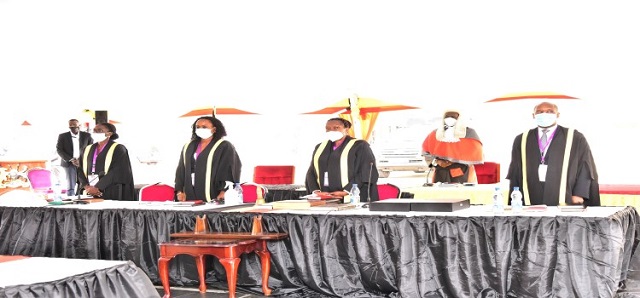
Kampala, Uganda | THE INDEPENDENT | Members of the 11th Parliament will on Friday, 25 March 2022 convene at Kololo Ceremonial Grounds in the capital to elect their new Speaker.
According to a communication from the Clerk to Parliament, Adolf Mwesige Kasaija, MPs have been invited to attend this plenary sitting scheduled to commence at 10.00am.
This results from a leadership vacuum following the demise of the Rt Hon. Speaker, Jacob Oulanyah, who breathed his last in Seattle, United States of America (USA) on Sunday, 20 March 2022. Oulanyah’s body is expected to be repatriated this week.
The Speaker’s unprecedented death forces MPs back to the ballot box hardly a year after they converged at the same venue where Oulanyah and Anita Among were elected Speaker and Deputy Speaker respectively.
Parliament’s decision to elect the new Speaker as fast as possible is guided by Article 82 (4) of the 1995 Constitution of the Republic of Uganda that refrains Parliament from conducting any other business other than the election of the Speaker at any time that office is vacant.
As a result, the National Resistance Movement (NRM) ruling party has already hit the ground running and has through their Central Executive Committee (CEC) nominated Among, the Deputy Speaker, as their party candidate for the speakership position in a meeting that took place on Wednesday.
On the other hand, the Opposition parties met to front a candidate ahead of the polls endorsing Bugiri Municipality MP Asuman Basalirwa.
What to expect on Friday
The process on the election of the Speaker of Parliament is guided by Rule 5 of the Parliament Rules of Procedure which requires that the Speaker shall be elected by MPs with voting rights in a plenary sitting that will be presided over by the Chief Justice or a Judge designated by the Chief Justice.
Under Rule 5 (8), a person presiding shall then invite nominations from MPs present. The nominee will be required to consent to the nomination and subsequently, be seconded before the proposer gives a brief statement of the background and qualifications of the nominee.
In the event that only one person is nominated for the position of Speaker, he or she shall be declared elected and conducted to the Chair.
Rule 5 (12) of the Rules of Procedure, states that where more than one person is nominated, the House shall proceed to elect a Speaker by a secret ballot under sub rule 7.
Rule 5 (14) guides how the voting shall be conducted that is to say;
(a) the Clerk shall ascertain the number of Members present;
(b) before voting commences, the person presiding shall cause to be produced one ballot box and cause to be demonstrated the fact that it is empty;
(c) the person presiding shall cause to be given to each Member of Parliament present a ballot paper on which the Member may record his or her vote by writing the name of the person for whom he or she wishes to vote and depositing it in the ballot box;
(d) a Member who wishes to vote shall proceed to a booth or designated area for the purpose and located to and within reasonable distance of the ballot box and shall, while there, write the name of the candidate of his or her choice, fold the marked ballot paper and drop it in the ballot box;
(e) on the election of a Speaker no vote may be cast, or abstention recorded, by proxy;
(f) after all Members who wish to vote have voted, the person presiding shall, in full view of the Members present, cause the Clerk to empty the ballot box and immediately count the ballot papers contained in it;
(g) at the completion of counting, the person presiding shall announce the result of the voting specifying — (i) the total number of ballot papers contained in the ballot box; (ii) the total number of Members who have abstained from voting; (iii) the number of both spoilt and blank ballot papers; and (iv) the number of votes obtained by each nominee;
(h) where two or more persons are nominated for the office of Speaker, the person who receives the majority of the votes of all Members present and voting shall be declared Speaker, and if no person receives that majority, a second election shall be held between the two persons who obtained the highest number of votes;
(i) where at any ballot between two nominees the votes are equal, another ballot shall be held; and
(j) where a second election has to be held under paragraph (h) and two or more persons receive equal votes in the second position there shall be a ballot to determine the person to stand in that second election and this shall be repeated where there are ties until one person can be identified.
Under Rule 5 (15), the person elected Speaker shall then be conducted to the Chair and before assuming the duties of the Office of Speaker, the speaker-elect shall, in the manner prescribed by law, take and subscribe to the Oath of Speaker specified in the Fourth Schedule to the Constitution as required by Article 82 (10) of the Constitution.
Upon taking oath, the new Speaker will be presented with the Mace, the Uganda Flag, the Court of Arms, the Speaker’s robes, the Rules of Procedure of Parliament and the Constitution of the Republic of Uganda.
In the event that Deputy Speaker Anita Among is voted Speaker on Friday, she will have to immediately preside over the election of the Deputy Speaker as stipulated by Rule 6 (4) of the Rules of Procedure which also states that, “An election to the Office of Deputy Speaker shall be held at the first sitting of Parliament after that office becomes vacant.”
The election of the Deputy Speaker will be conducted in a similar manner highlighted under Rule 5 of the Rules of Procedure.
*****
SOURCE: UGANDA PARLIAMENT MEDIA
 The Independent Uganda: You get the Truth we Pay the Price
The Independent Uganda: You get the Truth we Pay the Price



